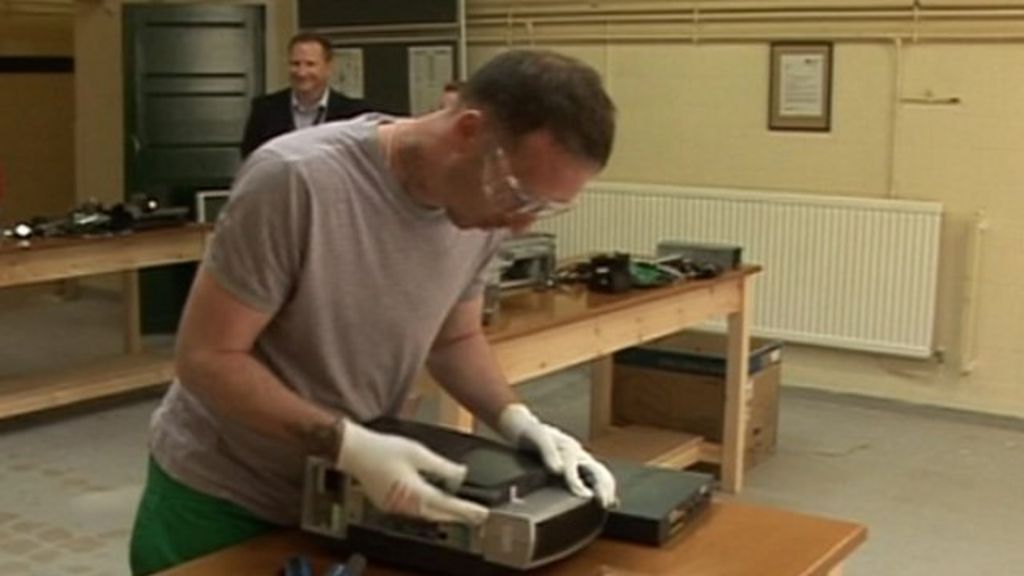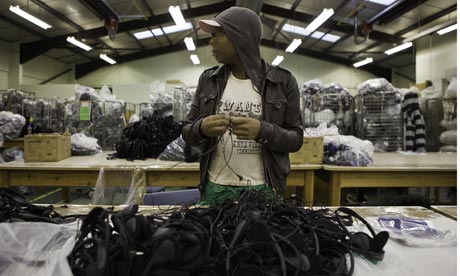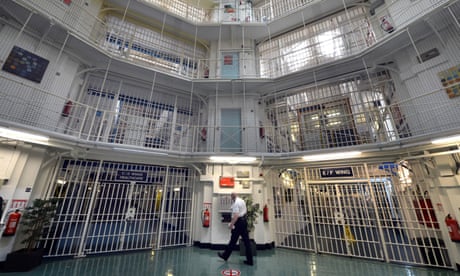Prison Labour
Overview
 During every moment of a prison sentence, someone somewhere is profiting from that person being caged. The UK has the most privatised prison system in Europe, and since the early 1990s, when the first private prisons were built, prisons are increasingly being used to line the pockets of companies and individuals. Prisons have always benefited those in power; a longstanding tool of social control and repression used against working class communities.
During every moment of a prison sentence, someone somewhere is profiting from that person being caged. The UK has the most privatised prison system in Europe, and since the early 1990s, when the first private prisons were built, prisons are increasingly being used to line the pockets of companies and individuals. Prisons have always benefited those in power; a longstanding tool of social control and repression used against working class communities.
Prisoners that work in prisons have no rights to organise, no contracts, no pensions, no right to to choose what they do – they have no use of the gains that workers have fought and died for over centuries. If prisoners refuse to work they are punished via the IEP (Incentives and Earned Privileges Scheme), and can have visits, association (time outside in a courtyard or out of cell) and other ‘privileges’ take away from them. They are the ultimate captive workforce for capitalist industries and have been used to break strikes, while simultaneously taking jobs out of communities and into prisons. Prison labour has been used as a tool for conquest and domination for centuries, from using convict labour to colonise countries, to putting prisoners to work in making goods for armies and war.
IWOC are working on a report about Prison Labour and Prisoner Exploitation in England, Wales and Scotland that will hopefully be available by Summer 2016. These key facts and statistics paint a brief overview of prison labour here:
- One3One Solutions is the trading arm of the Ministry of Justice founded in 2012. Over 9,700 prisoners were employed in their profit-making partnerships with private companies, with a total of 13.1 million prisoner working hours being recorded (1).
 Private sector prisons (those run for-profit) reported that they delivered over 1.5 million prisoner working hours involving over 1,200 prisoners in 2012/13. (1)
Private sector prisons (those run for-profit) reported that they delivered over 1.5 million prisoner working hours involving over 1,200 prisoners in 2012/13. (1)
- Prisoners working full time at a minimum will receive £4 a week. Prisoners working in workshops run by private companies may earn up to £25 per week if they are lucky. The average pay if you are a wing cleaner or gardener is about £6-7. Rates of pay are set out in the Prison Service Order 4460 (2). If prisoners are sick on the short-term they may get £2.50 a week. For prisoners that simply cannot work because they are ill long-term or old, they receive £3.25 a week. Likewise, Asylum Seekers in Detention Centres (that are all run for profit), are paid at the very most £1.25 per hour(3).
What work do prisoners do?
 Prisoners in England, Wales, Ireland and Scotland mainly do four things:
Prisoners in England, Wales, Ireland and Scotland mainly do four things:
- They work to maintain the jail – for example cleaning landings, maintaining grounds and gardens, or working in the kitchens and laundries.
- They do mundane and repetitive work for external companies who have contracts with the prison. This could be tasks such as bagging nails, putting bits of plastic in fruit boxes, packing headphones, stuffing envelopes, and assembling simple electrical components
- The work in more specialist workshops with more complex production tasks. These are mainly for external companies but can also be used in the prison. This might be for example making making window frames and furniture, plastic household goods, and light engineering. Prisoners may staff a Call Centre and can also do highly specialist work, like graphic design.
- Prisoners are also been employed in specialist roles with more responsibility, for example in prisoner housing departments or as volunteer drug workers. People in Detention Centres may also do highly specialised work such as translation. They may also do things like catering in prison enterprises such as restaurants for the public.
Why do prisoners work?
Most prisoners need the money and want to be able to get out of their cells, which work gives them. In prison you need to pay for your own phone credit and canteen items (such as tobacco, additional food/snacks, cosmetics). Most prisoner families cannot afford to send money in every month and most prisoners do not want to be banged up for 23 hours a day if they do not have a job. (See the Myths section for more about this reality for prisoners).
But what about rehabilitation? Isn’t it better than being banged up?
 In its desperate attempt to maintain a violent, racist, sexist institution like the prison service, the state and media work together to convince us that prisons are natural, normal and necessary and needed for our safety. IWOC wants to contend these myths and you can read more about each of these issues below:
In its desperate attempt to maintain a violent, racist, sexist institution like the prison service, the state and media work together to convince us that prisons are natural, normal and necessary and needed for our safety. IWOC wants to contend these myths and you can read more about each of these issues below:
- Myths about Prison Labour – a page exploring myths like prison labour prepares people for work, supports with rehabilitation and so forth.
- The Prison Industrial Complex – The role of prison labour in maintaining the bigger system some people call the ‘Prison Industrial Complex’ that uses imprisonment as a way to allegedly solve social and economic problems caused by capitalism and the state.
- Prison Expansion – Learn about the proposed new mega prisons in England and Wales.
Sources
Add a Comment
You must be logged in to post a comment.
No Responses